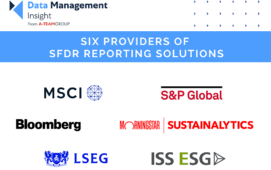
Institutional Shareholder Services’ (ISS) has launched a suite of nature- and natural resources-linked products as biodiversity protection and risk mitigation rise in prominence on among investor concerns.
ISS ESG’s Biodiversity Impact Assessment Tool and the latest addition to its ESG indices, the Freshwater Index Series, are intended to give financial institutions better visibility into the impacts their investments are having on an aspect of environmental decline that the company said has often been overlooked.
The Biodiversity Impact Assessment Tool enables investors to take a bottom-up view of the impact a company’s business operations have on nature. It offers two impact gauges: Potential Disappeared Fraction (PDF), which gives an indication of the loss of species over a given area– the higher the value, the greater the impact of the company’s activities; and, Mean Species Abundance (MSA), which provides a value for the proportion of biodiversity that remains intact.
The Freshwater Index Series, meanwhile, is based on ISS ESG’s Water Risk Ratings and provides a benchmark against which investors can track the performance of companies in their use and management of freshwater as well as the risks they face from floods and droughts.
The products have been released as world leaders prepare to gather in Montreal, Canada, for the United Nations’ COP15 summit on biodiversity. The event, held in December, has set itself the daunting goal of reversing biodiversity loss, which according to estimates has seen about a third of species made extinct by human activity.
Economic Imperative
Capital market interest in biodiversity protection and risks has risen as other studies, including one by the UK government, suggested that around US$44 trillion of global economic activity is highly dependent on biodiversity. While climate change has dominated the environmental agenda for financial institutions, the creation of the Taskforce for Nature-related Financial Disclosure (TFND) has helped lift biodiversity up the agenda, said ISS ESG head of research solutions products Brian Colantropo.
“It has become increasingly apparent that in terms of emerging trends, biodiversity really is right there with climate change at top of mind for investors,” Colantropo told ESG Insight. “Our goal was to create a resource that the institutional investment world can use to understand the risk and impact of their investment portfolios on biodiversity.”
ISS ESG’s product is built on models created with Swiss environmental sustainability consultancy Quantis using geospatial data and metrics that follow reporting frameworks set by the European Union’s Sustainable Finance Disclosure Regulation (SFDR) and Principle Adverse Impact (PAI) assessments, among others.
The tool measures impact according to 10 environmental factors, including land transformation, climate change, water availability and habitat acidification.
It can be used in conjunction with ISS ESG’s Biodiversity Thematic Engagement Solution, a service that provides channels through which investors can help companies improve their interactions with nature.
Data Challenge
Rising concern among market participants about biodiversity loss have been exacerbated by the difficulty in gathering data on the issue. In an ESG Insight webinar earlier this year Anyve Arakelijan, regulatory policy adviser on ESG and stewardship at the European Fund and Asset Management Association (EFAMA), said firms were unable to comply with parts of the SFDR because there was a lack of reliable information on biodiversity.
“Quantifying this is very challenging,” said ISS ESG’s Colantropo, who joined the company earlier this year.
To help overcome this, he said, ISS ESG had factored in product lifecycle impact assessments mapped to the Impact World+ structure. The formula, created by the Canada-based International Reference Centre for Life Cycle Assessment and Sustainable Transition (CIRAIG), seeks to establish how the design, creation, use and disposal of a product affects nature.
“That we are able to offer this now certainly comes from a further understanding of a lot of the inputs” needed to make the necessary calculations, he added.
Geospatial data also backs ISS ESG’s Freshwater Index series, which provide assessments for more than 7,000 issuers. Hernando Cortina, head of index strategy, said the new series release had been timely, considering the recent severe flooding in Pakistan and drought in the western states of the US.
“Investors want to protect themselves against that,” Cortina told ESG Insight.
The index series enables investors to assess issuers’ exposure to water risks and how well they manage it. Risks are rated on a scale from negligible to high.
Subscribe to our newsletter




